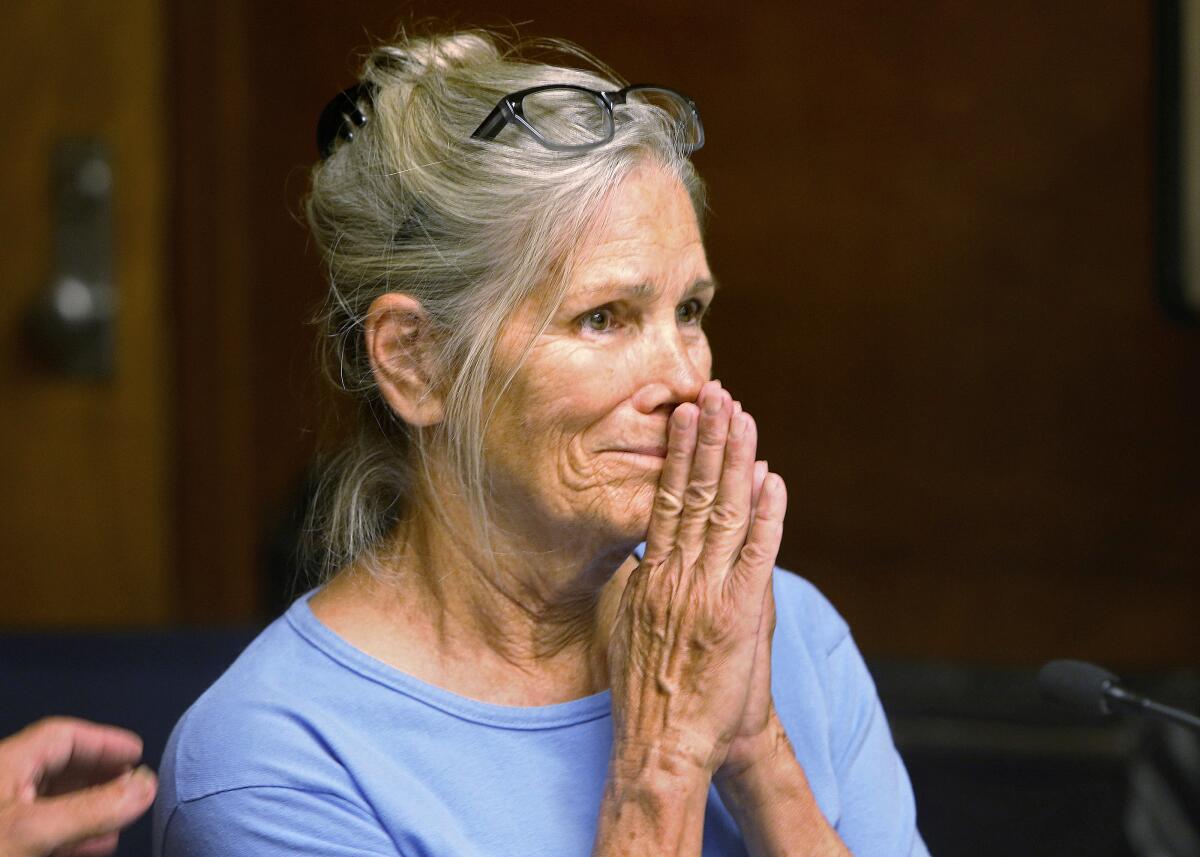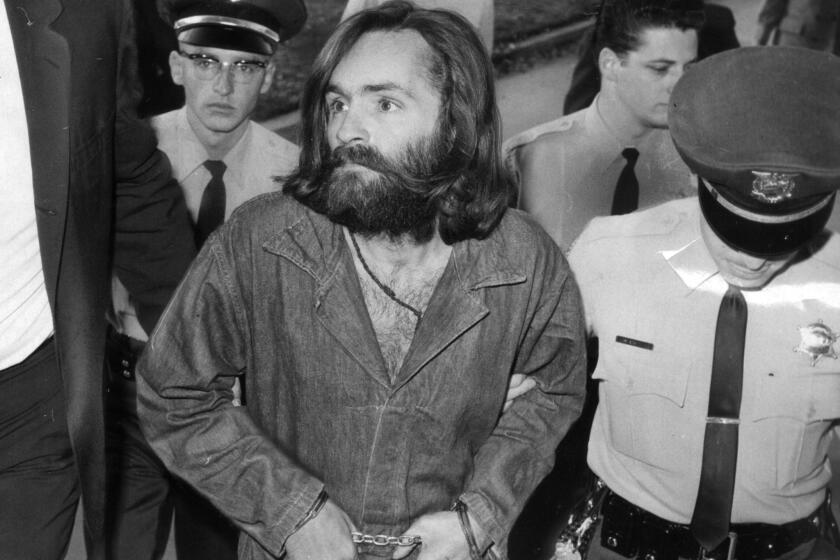Manson follower Leslie Van Houten could be freed after court overrules Newsom

- Share via
Leslie Van Houten, a follower of cult leader Charles Manson who took part in murders on his orders, is entitled to parole after spending more than 50 years behind bars, a California appeals court ruled Tuesday, reversing Gov. Gavin Newsom’s decision to deny her release.
Van Houten, 73, has been recommended for parole five times since 2016, but all were denied by Newsom or his predecessor, Gov. Jerry Brown. Tuesday’s decision by the 2nd District Court of Appeal is the first time a court has overruled a governor’s denial of parole to a Manson follower.
In 2020, the Board of Parole Hearings recommended Van Houten for parole, saying she did not “pose an unreasonable risk to public safety” and showed remorse for her crimes. Newsom rejected her latest parole recommendation in 2022 and said Van Houten would pose an “unreasonable danger” if released.
Newsom wrote in his denial that there were inconsistencies between Van Houten’s recent statements and those she made during the killings in the summer of 1969, indicating “gaps in Ms. Van Houten’s insight or candor, or both.”
Read our full coverage of the Manson murders.
Judges for the appellate court in Los Angeles wrote that Newsom’s rejection “fails to account for the decades of therapy, self-help programming and reflection Van Houten has undergone in the past 50 years.”
Newsom has a 10-day window, which begins in 30 days, in which he could ask Atty. Gen. Rob Bonta to petition the California Supreme Court to reverse the decision.
One of Van Houten’s attorneys, Rich Pfeiffer, said he expected Newsom to appeal the decision to the state Supreme Court, and to request a stay of her release on parole pending the court’s review of the decision. He also said that although Van Houten could be released as soon as Wednesday, it usually takes about five days to release an inmate pursuant to normal procedures.
“The governor, I don’t blame him because he’s been put in a really bad spot,” Pfeiffer said. “He was given power to reverse or grant parole. There’s a lot of people [who] don’t even know facts of the case that well and they want Leslie to stay in for the rest of her life. He could lose a lot of votes over that.”

A spokesperson for the governor’s office did not have information about whether Newsom would petition the decision to the Supreme Court and had no comment or statement on Tuesday’s ruling. The attorney general’s office referred all requests for comment to the governor’s office.
Van Houten is serving a life sentence for helping Manson and members of the Manson “family” kill Los Angeles grocer Leno LaBianca and his wife, Rosemary, in August 1969. Van Houten, who was 19 at the time, and the others fatally stabbed the LaBiancas and smeared their blood on the walls of the couple’s Los Feliz home.
During the murders, Van Houten put a pillowcase over Rosemary LaBianca’s head while Charles “Tex” Watson, another member of the Manson family, stabbed Leno LaBianca. Patricia Krenwinkel and Watson then stabbed Rosemary. Although Van Houten suspected that Rosemary was already dead, she said she “didn’t know for sure” and stabbed her 14 to 16 times with a knife.
The day before, four members of the Manson family had driven to the Benedict Canyon home of actress Sharon Tate and her husband, film director Roman Polanski. While Polanski was away on a film shoot, the four killed a pregnant Tate and her friends Jay Sebring; coffee heiress Abigail Folger; Folger’s boyfriend, Voytek Frykowski; and Steven Parent.
The Tate-LaBianca murders drew international intention and came to symbolize Los Angeles during the late 1960s.
Manson and his followers were sentenced to death in 1971, but those sentences were commuted to life in prison after capital punishment was ruled unconstitutional in 1972.
Van Houten’s case was overturned on appeal; she was later convicted of murder and conspiracy to commit murder, and sentenced to life in prison with the possibility of parole.
Pfeiffer, Van Houten’s attorney, said he didn’t expect the ruling to be overturned by the Supreme Court because Van Houten has the “best prison record out of anyone in the state of California.”
According to the judges’ ruling, Van Houten earned her master’s degree in humanities while incarcerated and worked as a tutor. She also participated in various self-help and mental health programs, was the chairperson of the Inmate Advisory Council, and the facilitator in the Victim Offender Education Group and the Actors’ Gang Prison Project.
She had a single disciplinary write-up in 1981 for “verbally communicating with women” but has since had a spotless record.
Van Houten grew up in Southern California; her parents divorced when she was 14, and she began using drugs, including marijuana, benzedrine and LSD. She became pregnant at 17 and had an abortion.
She lived with her mother until she graduated from high school and lived with her father and stepmother while she was attending Sawyer College and earning her legal secretary certificate.
Van Houten started living at Spahn Ranch in Chatsworth, the location of a commune created by Manson, after hearing about it during her travels along the California coast. Van Houten initially described the commune as “idyllic” but said it also had a “sinister side,” with Manson espousing beliefs in a “race war” between Black and white people. Manson believed that the “family” had to start killing white people in order to start the race war.
In 2017, Manson died of natural causes while serving a life sentence.
More to Read
Sign up for Essential California
The most important California stories and recommendations in your inbox every morning.
You may occasionally receive promotional content from the Los Angeles Times.















